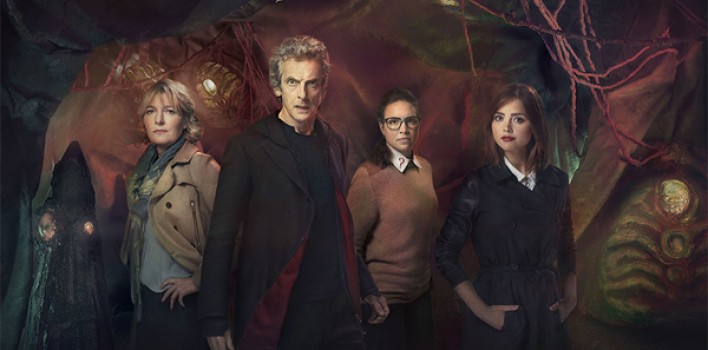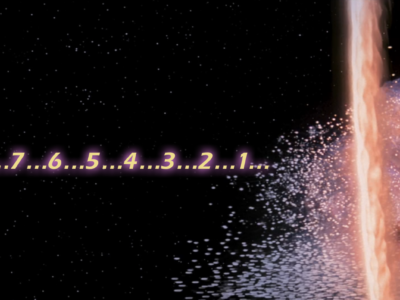Who·ology #020 – S09E08 The Zygon Inversion
Welcome Whovians, to the new incarnation of Who·ology here on Reel World Theology. Unlike the return of Missy to this season of Doctor Who, we have reasons for the regeneration of this weekly feature from podcast to written review, but suffice to say, we still love Who and still plan to bring you our take on it each week to hopefully stir some discussion. So let’s get to it!
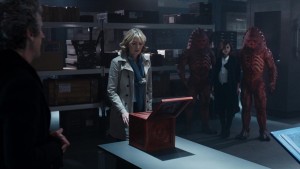 Invert: [v. in-vurt]
Invert: [v. in-vurt]
- to reverse in position, order, direction, or relationship.
- to turn or change to the opposite or contrary, as in nature, bearing, or effect.
It turns out that you can go on imagining that the people around you may be Zygons in disguise. The Zygon invasion is over, the uprising quelled. Thanks to the Doctor, a bloody war was averted and the ceasefire has been reinstalled. It made for one of the best episodes of the series (something I have been saying a lot lately) and along the way we learn a sharp lesson about the cost of peace.
There is so much to unpack in this episode. It makes my job a lot harder, but I am extremely grateful for that. Our Zygon Clara is now a Zygon Osgood (excuse me, just “Osgood”). The Doctor knows something about what may or may not have already happened to our actual Clara. And the Zygons are living among us in peace once again. I could spend a whole review on each one of these cursory plot lines, but the real triumph of this episode is the Doctor’s speech to Bonnie.
The Doctor: “You want cruelty to beget cruelty. You’re not superior to people who were cruel to you. You’re just a bunch of new cruel people… the only way people can live in peace is if they’re prepared to forgive.”
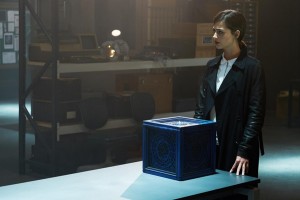 This is Doctor Who at its absolute best, folks. Science fiction providing us entertainment wrapped around powerful, honest insight into the human condition is what this show is meant for. I don’t know why we took such a detour away from it for the spectacle and the tangential, but this feels like we are finally back to what made this show essential.
This is Doctor Who at its absolute best, folks. Science fiction providing us entertainment wrapped around powerful, honest insight into the human condition is what this show is meant for. I don’t know why we took such a detour away from it for the spectacle and the tangential, but this feels like we are finally back to what made this show essential.
As I wrote in my review of part one of this Zygon story, the idea of peace is one that requires grace in order to succeed. You have to shed your self-righteousness and the idea that what is right to you is worth more what is right to someone else. In this episode, the Doctor takes it to the next step- the practical application of grace is forgiveness. So, in order to have peace you have to forgive. Forgiveness transcends belief. In fact, it is the single most unifying act that can exist between two opposed parties. It is far more effective, and far more permanent than war could ever be.
The Doctor: “What is it that you want?”
Bonnie: “War.”
The Doctor: “And when this war is over and you have a homeland free from humans, what do you think it’s going to be like? Let me ask you a question about this brave new world of yours. When you’ve killed all the bad guys, and when it’s all perfect and just and fair, when you have finally got it exactly the way you want it, what are you going to do with the people like you- the troublemakers? How are you going to protect your glorious revolution from the next one?”
The problem with Bonnie’s sense of justice is that it is short-sighted. The Doctor recognizes this all too well, having been the “War Doctor” during the Time War and having seen first hand the horrors of war. He knows the cost is not worth the result. This is often the same as our sense of morality. What is “right” is not always what is “good.”
The Doctor: “It’s always the same. When you fire that first shot, no matter how right you feel, you have no idea who’s going to die.”
Ultimately, if given everything that she wants, Bonnie’s Zygon uprising will end and her new world order will become the norm. The norm will soon find it’s own detractors and another uprising will likely result. War begets war. Death begets death. But forgiveness begets peace. It seems so simple. So why do we choose our upright morality over peace?
“We are half-hearted creatures, fooling about with drink and sex and ambition when infinite joy is offered us, like an ignorant child who wants to go on making mud pies in a slum because he cannot imagine what is meant by the offer of a holiday at the sea. We are far too easily pleased.” – CS Lewis
I often site this quote, as I don’t know of one that better describes the attention span of the human heart when it comes to things eternal. I hate to burst your bubble, but whatever it is that you want, whatever you crave, long for, fight for- the reality is it will never be enough. Try relying on that thing you so desperately want to fulfill you. It will always let you down in the end. Christ is the only one that promises to never let us down and has been proven true to that promise. But we are far too easily pleased. Side note: The Doctor sounds a lot like CS Lewis sometimes.
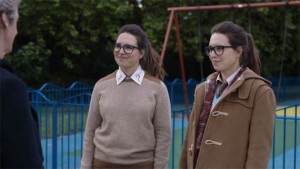 Now imagine that you’d be prepared to go to war for that one thing that has proven time and again will let you down. Imagine your hand on the button ready to end a life for that thing. Oh, how right you think you are for wanting it. But what will you have you gained at the cost of a life, or many lives?
Now imagine that you’d be prepared to go to war for that one thing that has proven time and again will let you down. Imagine your hand on the button ready to end a life for that thing. Oh, how right you think you are for wanting it. But what will you have you gained at the cost of a life, or many lives?
I think you’ll find your answer lacking. Bonnie the Zygon was able to forgive. It’s not something we often see from Doctor Who villains, who usually end up ignoring the Doctor’s olive branch of peace and find themselves destroyed by their own hand. But Bonnie did the thing that is most difficult for us to do- she inverted her self-righteousness. Literally the only way to find your way to forgiveness is to figuratively turn yourself inside out, reversing your course and exposing your sense of justice to the judgment of others. It’s painful, but it is freeing. In doing so, the Zygons, who fought so hard and were prepared to die to find the freedom to be themselves, found it by losing their war and gaining grace. If only we more often had half the heart to do the same.
Forgive: [v. fer-give]
- to grant pardon for or remission of; absolve.
- to give up all claim on account of; remit (a debt, obligation, etc.).
Next time on Who-ology: Humans trying to play God and incidentally creating an abomination? That sounds about right. In a first for Doctor Who, the episode utilizes “found-footage” style as it’s primary plot device. It also looks like vintage Who-rror, and if things keep going the way of this season, I think we’re in for another classic. Strap in. Only four episodes left!


